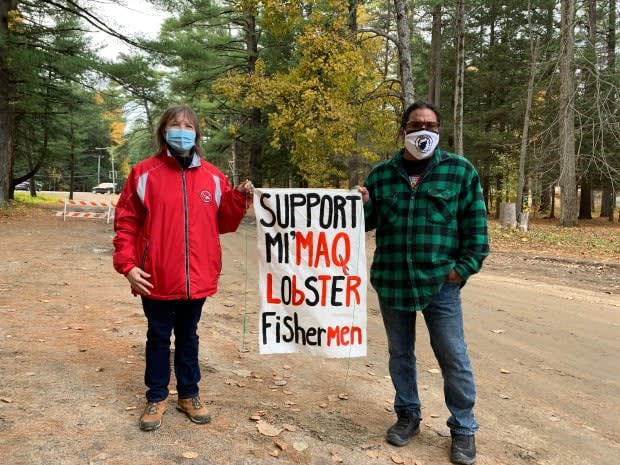Violent opposition to Mi'kmaw fishery 'nothing new,' N.L. chief says
A weeks-long skirmish between commercial fisherman and Mi'kmaq harvesters in Nova Scotia has the Conne River community sending their support for Indigenous fishing rights from afar.
Chief Mi'sel Joe of the Miawpukek First Nation, Newfoundland's sole Mi'kmaw community, says he'd be at the protests in support of the Nova Scotia harvesters if he could, but COVID-19 has prevented safe travel.
Instead, it's left him watching, and worrying, from across provincial borders.
"It's reliving all over again when the Marshall treaty broke years ago," Joe said, referring to a reported attack on Mi'kmaq crab harvesters on the Burin Peninsula in 1999, shortly after the Supreme Court ruling that removed catch limits for some Indigenous fishers in parts of Atlantic Canada.
At the time, witnesses reported seeing local Newfoundland fishermen burning the clothing of a Mi'kmaq crew in an attempt to drive them away.
"This is nothing new. It's been going on ever since the Marshall decision came out," Joe said.
"You can only hope and pray that nobody gets hurt from it all."
Joe said he's looking at ways to support the Mi'kmaq harvesters in Nova Scotia, whether financially or through a local rally and public relations campaign.
Tensions have been ongoing there for weeks.

In September, commercial fishermen in Nova Scotia held a peaceful protest in Weymouth, N.S., that turned confrontational.
Those protesters argued a nearby communal First Nations lobster fishery — where the sale of the catch is prohibited — was being used as a cloak for a large-scale commercial operation.
The Mi'kmaq reject that claim, arguing their right to fish for a moderate livelihood was affirmed by the 1999 Marshall decision.
Racism a part of this, Miawpukek chief says
Here in Newfoundland, Joe says First Nations harvesters abide by regulations set out for the general population. The Marshall decision affects First Nations only in New Brunswick, Prince Edward Island, Nova Scotia and the Gaspé region of Quebec, according to Fisheries and Oceans Canada.
Conflict near the fishing grounds in Nova Scotia's St. Mary's Bay has escalated since the initial confrontation in September, with anti-Mi'kmaq mobs accused of destroying lobster stores and property.
A fire at a lobster pound last week, deemed suspicious by the RCMP, sent one man to hospital with life-threatening injuries.
Federal Indigenous Services Minister Marc Miller called those encroachments "unacceptable acts of violence."
The acts follow a number of high-profile anti-Indigenous incidents across the country, including use of force by a Happy Valley-Goose Bay enforcement officer on an Inuk man caught on tape and the verbal abuse of a dying Atikamekw woman in Quebec by hospital staff.
"Racism and prejudice is all a part of this," Joe said of the threats and fires. "We have to wake up and realize those things are happening in this country."
He's not confident peace will return swiftly to St. Mary's Bay.
"It's rough going, from what I gather," he said. "It's probably going to get worse before it gets a lot better."
Read more from CBC Newfoundland and Labrador

